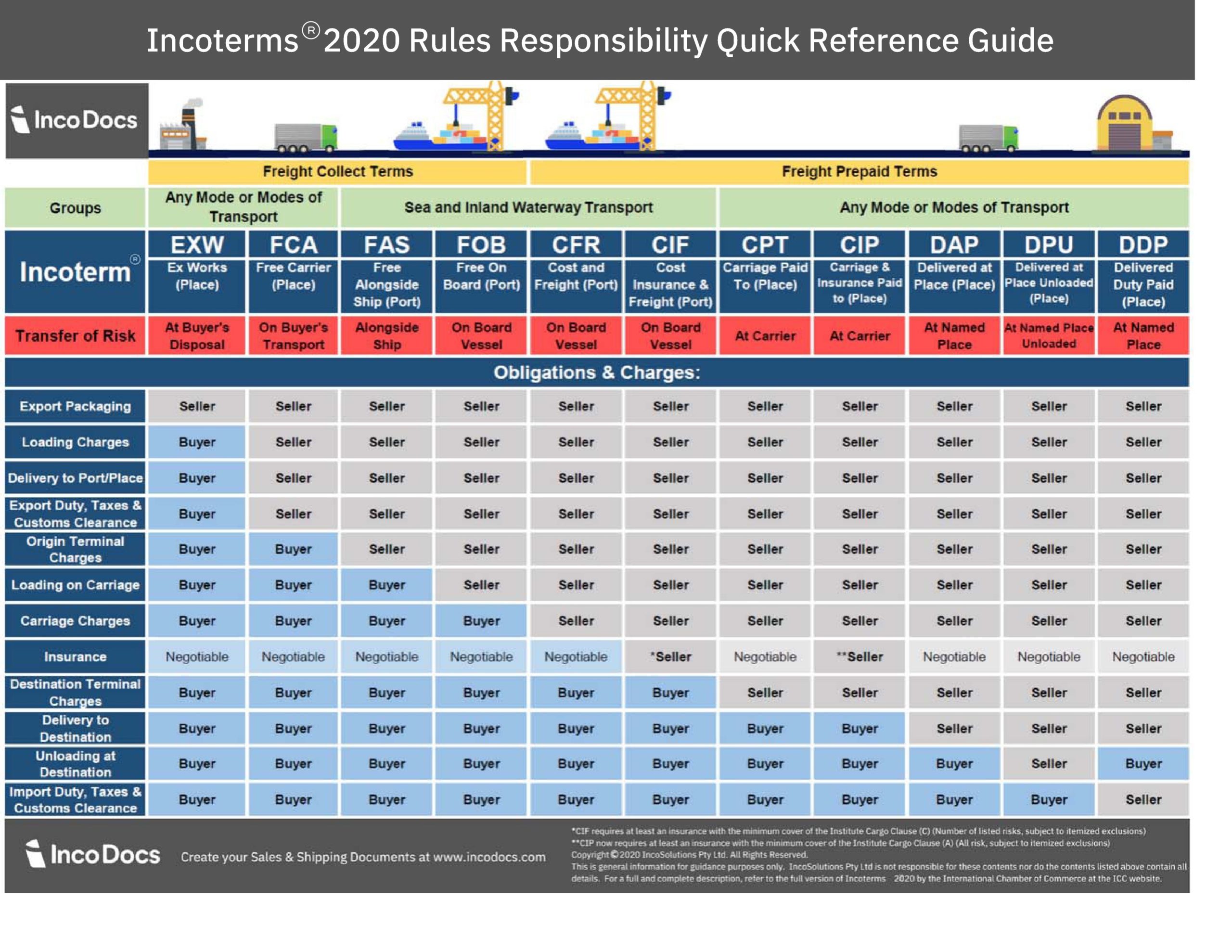New INCOTERMS effective January 1, 2020
The International Chamber of Commerce (ICC ) has published revisions to its International Commercial Terms, also known as INCOTERMS®, that take effect on January 1, 2020.
The revised rules, designated “INCOTERMS 2020″, contain 5 big changes: Delivered at Terminal (DAT) is now Delivered at Place Unloaded (DPU), Insurance points are clarified in CIF and CIP rules, transport security is now well defined, own transport is accounted for, and changes to FCA/FOB regarding Bills of Lading. INCOTERMS 2020 has not changed considerably, but the small changes were important ones in international trade.
WHAT INCOTERMS ARE – INCOTERMS are a set of three-letter standard trade terms most commonly used in international contracts for the sale of goods. First published in 1936, INCOTERMS provide internationally accepted definitions and rules of interpretation for most common commercial terms. In the US, INCOTERMS are increasingly used in domestic sales contracts rather than UCC shipment and delivery terms.
WHAT INCOTERMS DO – INCOTERMS inform the sales contract by defining the respective obligations, costs and risks involved in the delivery of goods from the Seller to the Buyer.
WHAT INCOTERMS DO NOT DO – INCOTERMS by themselves DO NOT:
- Constitute a contract;
- Supersede the law governing the contract;
- Define where title transfers; nor,
- Address the price payable, currency or credit terms.
These items are defined by the express terms in the sales contract and by the governing law.

INCOTERMS 2020 are grouped into two classes:
1. TERMS FOR ANY TRANSPORT MODE
- EXW – EX WORKS (… named place of delivery)
- FCA – FREE CARRIER (… named place of delivery)
- CPT – CARRIAGE PAID TO (… named place of destination)
- CIP – CARRIAGE AND INSURANCE PAID TO (… named place of destination)
- DPU – DELIVERED AT PLACE UNLOADED (…named place unloaded)
- DAP – DELIVERED AT PLACE (… named place of destination)
- DDP – DELIVERED DUTY PAID (… named place)
The Seller’s only responsibility is to make the goods available at the Seller’s premises. The Buyer bears full costs and risks of moving the goods from there to destination.
The Seller delivers the goods, cleared for export, to the carrier selected by the Buyer. The Seller loads the goods if the carrier pickup is at the Seller’s premises. From that point, the Buyer bears the costs and risks of moving the goods to destination.
The Seller pays for moving the goods to destination. From the time the goods are transferred to the first carrier, the Buyer bears the risks of loss or damage.
The Seller pays for moving the goods to destination. From the time the goods are transferred to the first carrier, the Buyer bears the risks of loss or damage. The Seller, however, purchases the cargo insurance.
The seller is responsible for arranging carriage and for delivering the goods, unloaded from the arriving conveyance, at the named place. There are no restrictions on the named place – for example, it can be a transport hub, a warehouse or the buyer’s depot. Risk transfers from seller to buyer when the goods have been unloaded. This is the only rule that requires the seller to unload the goods in order to complete delivery.
The Seller delivers when the goods are placed at the Buyer’s disposal on the arriving means of transport ready for unloading at the names place of destination. The Seller bears all risks involved in bringing the goods to the named place.
The Seller delivers the goods -cleared for import – to the Buyer at destination. The Seller bears all costs and risks of moving the goods to destination, including the payment of Customs duties and taxes.
2. MARITIME-ONLY TERMS
- FAS – FREE ALONGSIDE SHIP (… named port of shipment)
- FOB – FREE ON BOARD (… named port of shipment)
- CFR – COST AND FREIGHT (… named port of destination)
- CIF – COST INSURANCE AND FREIGHT (… named port of destination)
The Seller delivers the goods to the origin port. From that point, the Buyer bears all costs and risks of loss or damage.
The Seller delivers the goods on board the ship and clears the goods for export. From that point, the Buyer bears all costs and risks of loss or damage.
The Seller clears the goods for export and pays the costs of moving the goods to destination. The Buyer bears all risks of loss or damage.
The Seller clears the goods for export and pays the costs of moving the goods to the port of destination. The Buyer bears all risks of loss or damage. The Seller, however, purchases the cargo insurance.
